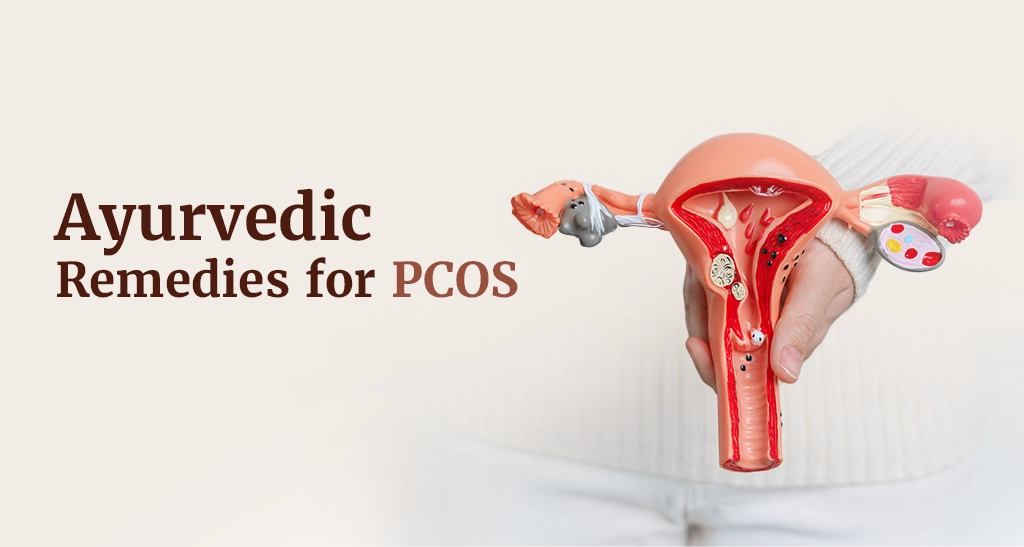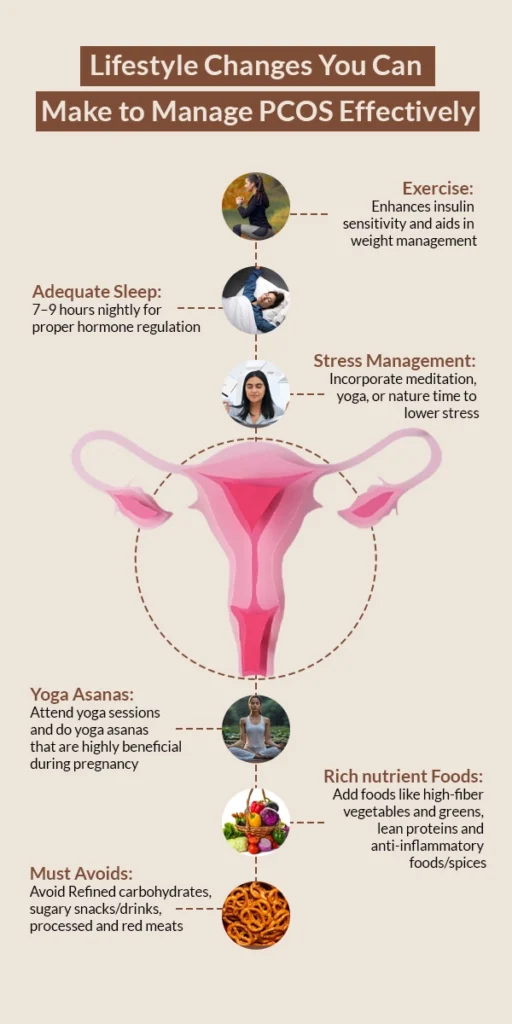Polycystic Ovarian Syndrome (PCOS) is one of the most common female endocrine disorders, affecting nearly 12% of women of reproductive age. Also known by names like Stein-Leventhal syndrome, functional ovarian hyperandrogenism, and sclerocystic ovary syndrome, PCOS is increasingly linked to unhealthy diets, stressful routines, and sedentary lifestyles.
It is not only the leading cause of female subfertility, but its symptoms vary greatly among individuals, making diagnosis and treatment challenging.
What is PCOS?
PCOS is a hormonal imbalance disorder seen in women of reproductive age. It is typically characterized by:
Elevated androgen (male hormone) levels
Irregular menstrual cycles
Polycystic ovaries, where immature follicles accumulate and may prevent ovulation
Common Symptoms of PCOS
- Irregular or missed periods
- Infertility
- Hirsutism (excessive facial/body hair)
- Obesity
- Acne, pigmentation, and skin tags
- Hair thinning or hair loss
- Metabolic syndrome (including insulin resistance)
Can Ayurveda Help in Managing PCOS?
Yes. Ayurveda offers a personalized and holistic approach to managing PCOS, focusing on balancing the three doshas (Vata, Pitta, and Kapha), cleansing the system, and promoting harmony through herbs, diet, yoga, and detox therapies.
Let’s explore Ayurvedic remedies across three key dimensions:
1. Herbal Remedies to Balance Hormones Naturally
Ayurveda recommends time-tested herbs that support reproductive health, improve hormonal regulation, and boost metabolism.
Shatavari: Known as the “Queen of Herbs” for women, it regulates menstrual cycles and supports ovulation by balancing hormones.
Guduchi: A powerful adaptogen and immunity booster that helps correct hormonal imbalances and reduce inflammation.
Ashoka: Supports proper uterine function and reduces abnormal bleeding.
Triphala: Aids digestion and detoxification, which is crucial for hormonal health.
These herbs are best used under the guidance of an Ayurvedic doctor, as the right combination and dosage depend on your dosha type and symptoms.
2. Lifestyle Changes: Supporting Healing from Within
Lifestyle habits play a major role in either aggravating or alleviating PCOS symptoms. Ayurveda recommends daily routines (Dinacharya) that support natural rhythm and dosha balance.
Key Lifestyle Recommendations:
Daily Physical Activity: Exercise improves insulin sensitivity and aids in weight management—a core component in PCOS care.
Adequate Sleep: 7–9 hours of deep, uninterrupted sleep is essential for hormonal balance.
Stress Management: Chronic stress exacerbates PCOS. Practice meditation, pranayama, or spend time in nature to calm the mind.
Consistency in routine is key. A peaceful mind and healthy metabolism create the foundation for hormonal harmony.
3. Yoga for PCOS: Aligning Mind and Body
Yoga is more than just physical movement—it’s a therapy for stress, circulation, and hormonal balance. Specific yoga asanas can relieve pelvic tension, stimulate the ovaries, and calm the nervous system.
Beneficial Yoga Asanas for PCOS:
Surya Namaskar (Sun Salutations): Boosts overall circulation and metabolism, improving hormonal regulation.
Supta Baddha Konasana (Reclining Butterfly Pose): Relaxes pelvic muscles and increases blood flow to the reproductive organs.
Bharadvajasana (Spinal Twist): Stimulates abdominal organs and aids digestion.
Balasana (Child’s Pose): Calms the nervous system and relieves lower abdominal tension.
Ustrasana (Camel Pose): Improves blood flow to the pelvic region and supports hormone secretion.
Practicing yoga regularly can have profound effects on your emotional and physical well-being.
4. Panchakarma: Detoxifying the Root Cause
Panchakarma is Ayurveda’s deep cleansing therapy aimed at removing toxins (Ama) and rebalancing the doshas. This is especially useful for chronic or stubborn PCOS cases.
Effective Panchakarma Treatments for PCOS:
Vamana: Therapeutic emesis to expel excess Kapha
Virechana: Purgation to eliminate Pitta toxins from the gut
Basti: Herbal enemas that regulate Vata and cleanse the colon
Reported Benefits of Panchakarma in PCOS:
- Reduction in abnormal discharges
- Lower stress and anxiety
- Better weight management
- Pain-free, regular menstruation
- Balanced hormone secretion
- Relief from itching or discomfort
Panchakarma is always customized based on your constitution (Prakriti) and symptoms. Always consult an Ayurvedic practitioner for proper supervision.
5. Diet in PCOS: What to Eat and Avoid
Food is medicine in Ayurveda. The right diet can stabilize blood sugar levels, improve digestion, and reduce inflammation—all of which are central to PCOS management.
Foods to add:
- High-fiber greens and vegetables
- Whole grains (like quinoa, brown rice)
- Lean protein (like fish and legumes)
- Anti-inflammatory spices like turmeric, ginger, cinnamon
Fiber slows digestion and helps reduce insulin resistance—a key factor in PCOS.
Foods to avoid:
- Refined carbohydrates (white bread, pastries)
- Processed snacks and sugary beverages
- Red and processed meats
- Dairy (for some women with Kapha dominance)
Tip: Keep your meals warm, light, and freshly prepared—this aligns with Ayurvedic digestive principles.
PCOS can feel overwhelming, but it doesn’t have to be. Through small yet powerful lifestyle changes, herbal support, and natural detox therapies, Ayurveda offers hope and healing for those struggling with this condition.
Remember, your body wants to heal—give it the support it needs. Even little changes, when done consistently, can make a significant difference in your hormonal health and overall well-being.












